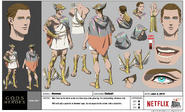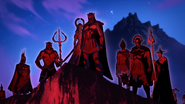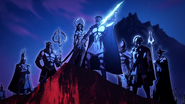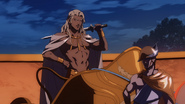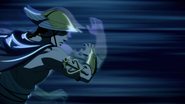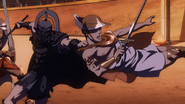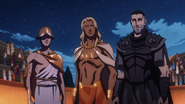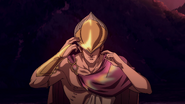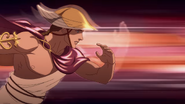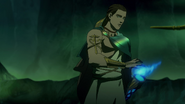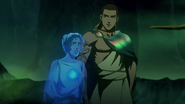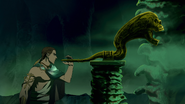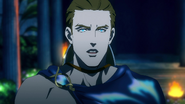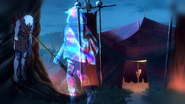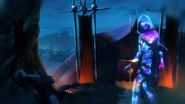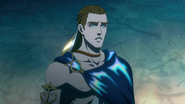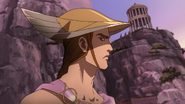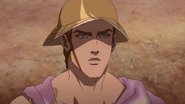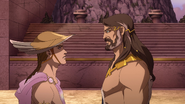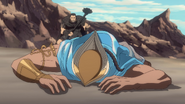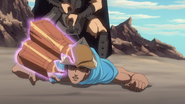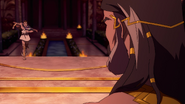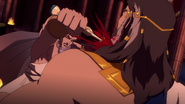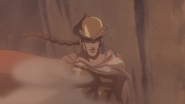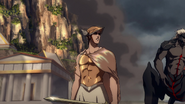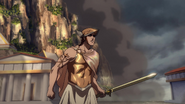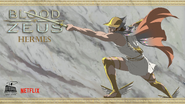- "He was very proud of you. As we all are, brother."
- ―Hermes to Heron in War for Olympus.
Hermes is a recurring character in Blood of Zeus. The swiftest of the gods, Hermes acts as the messenger of Olympus. Like Heron and Apollo, he is a child of Zeus born out of wedlock.
History[]
At some point, Zeus had another one of his affairs, and Hermes was born out of wedlock.
Throughout the Series[]
TBA...
Personality[]
During the entire series, Hermes is seen as being fully supporting his father Zeus before and during the Olympian civil war. He even went to give Zeus specific information on Hera and Seraphim's conspiracy and even followed Hera to learn more about her plans.
He is also seemingly sympathetic towards his brother, being the first one to greet him when he first arrives on Olympus and even being there for Heron after the Olympian civil war, alongside Apollo and Hephaestus comforting him and even calling him "brother."
Physical Appearance[]
Like many of the male gods, Hermes has a tall, muscular yet lean build. He has teal eyes and wears multiple gold accessories. He has a golden helmet that appears to have wings on them and wears winged boots. Similar to all the male gods, Hermes has a handsome face and a somewhat noticeable resemblance between his and Zeus. He has light brown hair which is braided and fair-toned skin similar to his father, Zeus. He has a medium-length hooded cape which is shown to be half tan and half reflective. When collecting souls or going on stealth missions, Hermes wears his helmet and puts his hood on.
Powers and Abilities[]
Olympian Deity Physiology: Hermes possesses the conventional superhuman physical attributes of an Olympian god.
- Immortality: Like all the Greek gods, Hermes seems ageless, or at least extremely long-lived.
- Immense Speed: Hermes' primary power is his godlike speed.[1] Olympian God of Speed, Hermes truly holds the potential of limitless speed, making him the swiftest of the gods. He is seen running at incredible speeds to deliver news, messages, or warnings. Though the exact limits of Hermes' speed is unknown, he can run at speeds of Mach 2 to Mach 4.6 (0.22-1.0 miles per second). Hermes is capable of reaching warp speed as he can travel back and forth between the dimensional realms of Earth and Olympus.
- Immense Reflexes: Heron speed also extends to his reflexes. His reflexes enable him to deflect projectiles and block the blows of his opponents with ease.
- Immense Strength: Hermes seems to have an undefined level of divine strength, as seen when he punched Hera several feet away; The faster Hermes accelerates towards his specific destination, the more his mass increases, greatly enhancing the force behind his punches.
- Immense Durability: Hermes seems to have a high degree of superhuman durability, as seen with his fight against Hera and Ares where he endured a substantial beating from them.
- Immense Stamina: Hermes' highly advanced musculature produces no fatigue toxins, enabling him to sustain almost indefinitely.
- Accelerated Healing: Hermes is able to heal from injuries at an accelerated rate. However, depending on how severe his injuries are, some injuries he's sustained can heal from in days and others take longer.
Abilities[]
Master Combatant: Hermes is an extraordinary formidable hand-to-hand combatant, particularly while using his speed in combat situations. He mastered several forms of unarmed combat, particularly wrestling.
Swordmanship: Hermes wielded a sword during his fight with Ares in the arena.
Equipment[]
- Winged Golden Helmet: Hermes wears a golden helmet with wings.
- Winged Shoes: Hermes wears winged sandals which evidently can boost his natural speed and limited flight capabilities.
- Cape of Invisibility:[2] Through his cape, Hermes is able to render himself unseen to both humans and gods alike.
- Armband: Hermes' armband apparently is what allows him to collect souls so that he may guide them to the Underworld. As a psychopomp or "soul guide," Hermes was able to take the souls of the Giants and place them in the cauldron after they were slain during the Gigantomachy.
- Swordmanship: Hermes wielded a sword during his fight with Ares in the arena.
Trivia[]
- Hermes was the messenger god in Greek Mythology. He is a protector of travelers, shepherds, and thieves. Hermes was born of Maia, a daughter of Atlas, by Zeus. He was born in a cave on Mount Cyllene. Hermes follows the archetype of the trickster. He was frequently portrayed to be witty and charismatic, but also a liar and a thief.
- Hermes superspeed was influenced by director Shaunt Nigoghossian's previous work with The Flash.[3]
Gallery[]
References[]
- ↑ War for Olympus
- ↑
 Powerhouse Animation (@PowerhouseAnimation) on Twitter "We apologize for hiding Hermes behind his cape of invisibility, but we have to give props to our compositing team for developing all the special vfx for #BloodofZeus. Shout out to @wickitoons, @JudeMurro, and Jen Fields for enhancing our experience of this amazing show." (screenshot)
Powerhouse Animation (@PowerhouseAnimation) on Twitter "We apologize for hiding Hermes behind his cape of invisibility, but we have to give props to our compositing team for developing all the special vfx for #BloodofZeus. Shout out to @wickitoons, @JudeMurro, and Jen Fields for enhancing our experience of this amazing show." (screenshot)
- ↑
 NX (@NXOnNetflix) on Twitter "The artists at @powerhouseanim put so much effort into Blood of Zeus, here’s some of their incredible background work along with insights on the show’s production." (screenshot)
NX (@NXOnNetflix) on Twitter "The artists at @powerhouseanim put so much effort into Blood of Zeus, here’s some of their incredible background work along with insights on the show’s production." (screenshot)
See also[]
| Blood of Zeus | |
|---|---|
| Characters | Heron • Zeus • Hera • Seraphim • Electra • Alexia • Evios • Kofi • Ariana • Hermes • Apollo • Ares • Poseidon • Hades |
| Species | Human • Demon • God • Titan • Giant • Wraith • Centaur |
| Items | Cauldron • Hades' Bident • Adamantium Sword |
| Location(s) | Olympus • Underworld • Corinth • Polis • Melidoni • Fields of the Dead |
| Seasons | Season 1 (Episode(s): A Call to Arms • Past is Prologue • The Raid • A Monster is Born • Escape or Die • Back to Olympus • The Fields of the Dead • War for Olympus) |






